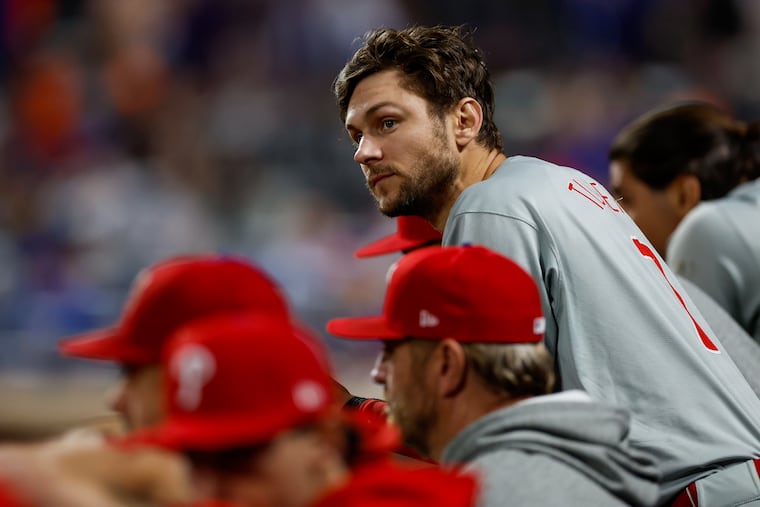A few hard truths about the Phillies before we blow them up this offseason
There are two things the Phillies can't do anything about, including the fact that Trea Turner is not a superstar.

Regular readers of this space know that one of my guiding truths in life is that multiple things can be true at the same time. It is applicable to most things in life, a subset that counts among it the Great Phillies Meltdown of 2024.
True: The feast-or-famine nature of the Phillies lineup is one of the main reasons they have lost three of their last four “real” postseason series.
Also true: The solution is not to “blow it up.”
» READ MORE: Phillies fans are out of hope. Some are also out thousands of dollars as they await postseason ticket refunds.
A couple points of clarification.
1. I’m defining “real” series as non-wild-card series, i.e. series that require more than two wins to clinch and require teams to play at home and on the road. Even then, we might be stretching the definition of “real.” One can argue that anything less than a seven-game series is a framework ill-suited for determining the better or more worthy team.
Of course, one also can argue that a seven-game series is an unrepresentative sample in a sport that plays a 162-game season. In the NBA and NHL, a playoff round is equivalent to about 8.5% of a season. Equal representation in Major League Baseball would be a nine-game series, which is still less than the number of games that division teams play each other in their regular season series. Five games is an abomination.
2. I’m not quite sure what people mean when they say the Phillies should “blow it up.” There ain’t no “blowing it up” for a team whose veteran players are virtually untradeable given the size and recency of the contracts they’ve signed. Sure, you could trade Bryce Harper, Zack Wheeler, and Kyle Schwarber for a haul. But that would mean another lost decade like 2012-21.
Nick Castellanos, Trea Turner, Taijuan Walker, probably Aaron Nola — all of them had negative value the moment they signed their contracts. That value has only depreciated further. I would guess that what people mean when they say the Phillies should “blow it up” is that they should blow up the current formula. That has some merit. But there are some hard truths.
The hard truths.
1. There’s nothing the Phillies can do to make up for Turner not being a superstar.
The more I look back on the Mets series, the more Turner emerges as a central figure, both in terms of what happened and what needs to happen moving forward. We can talk all we want about the bottom of the lineup, and I’ve talked plenty, but the reality is the bottom of the Mets lineup produced next to nothing in the series. The big difference between the teams was the No. 2 hitter (Mark Vientos) and the shortstop (Francisco Lindor). Vientos and Lindor combined to reach base 16 times with seven extra-base hits, 10 RBIs and seven runs. They drove in or scored 14 of the Mets’ 23 runs in the series. Turner, the shortstop and No. 2 hitter, reached base five times with no extra base hits, no RBIs, and two runs.
» READ MORE: The Phillies have a $300 million Trea Turner problem. The only solution is ... hope?
To be clear, I’m talking strictly within the context of this series. There was a time when Lindor looked like he was a bust for the Mets. The guy had a .765 OPS his first two years with the team. Point is, teams that are structured like the Mets and the Phillies need their big-money talent to earn those paychecks. Lindor did, Turner didn’t.
There isn’t much that can be done about that disparity. The Phillies paid Turner to be a fixture here for the next decade. He is going to be a fixture. It’s unrealistic to think that they can go out and give Juan Soto a $400 million contract to solve their problems. The Phillies have spent an awful lot of money over the last few offseasons. All of that money is still on the books. There are no do-overs.
2. There’s nothing the Phillies can do to make up for J.T. Realmuto aging the way 33-year-old catchers tend to age.
We forget how central a figure Realmuto was during the 2022 stretch run. He was a legitimate five-hole hitter who had an .820 OPS in the regular season and could be counted on for at least a couple of big hits or non-outs over the course of a postseason series. That wasn’t the case this year. He went 0-for-11 with three walks after a regular season in which he posted his lowest OPS and home run totals in years. Realmuto remains a very good catcher and an above-average hitter, well above average for the position. The question is whether he can give you one more season as a middle-of-the-order weapon.
Generally speaking, the hard truth about this Phillies team is that the money is already going where it will go. The production will need to follow. They can improve at the margins, for sure. They can hope that some of their young talent — Aiden Miller? — is ready for a shot at the big leagues next season. They have some optionality at third base and left field in Alec Bohm and Brandon Marsh.
But the postseason usually comes down to the superstars. The Phillies need theirs to produce.